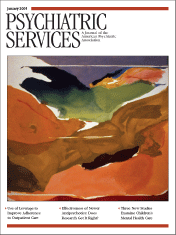To the Editor: In their article in the September 2004 issue, Dr. Keith and his colleagues (
1) recommended the use of long-acting risperidone for different patient groups, including patients with schizophrenia who are experiencing their first episode of psychosis. They discussed the rationale for using depot antipsychotics for this group: improved medication adherence, more frequent contact with service providers, and lower likelihood of relapse.
However, the use of long-acting risperidone for first-episode psychosis raises the important question of appropriate dosage, which was not adequately addressed. A MEDLINE and EMBASE search done on October 10, 2004, did not reveal any trial of long-acting risperidone in first-episode psychosis. Three different types of evidence support the use of lower dosages of antipsychotic medication for patients in this group than for patients experiencing subsequent episodes. First, comparisons of the treatment responses of patients experiencing a first episode and those who have chronic, multi-episode schizophrenia have shown that the former require dosages that are as much as 50 percent lower (
2). In a double-blind study of first-episode psychosis among patients with schizophrenia, 2 mg of risperidone was found to be as effective as 4 mg, with a lower incidence of fine-motor dysfunction and a lower rate of treatment dropout (
3). (Chlorpromazine-equivalent dosage is not established for long-acting risperidone. However, clinical trial data show that 25 mg is an adequate dosage for most patients with multi-episode schizophrenia. For first-episode psychosis, 50 percent of that dosage should be appropriate.)
Second, when the dosage was titrated by using the neuroleptic threshold method (that is, the antipsychotic dosage was increased until cogwheel rigidity was detected), low-dose risperidone—2 to 4 mg—was found to be equally effective as higher doses, with a lower incidence of extrapyramidal side effects (
4). Third, positron emission tomography (PET) studies have clarified the relationship between D
2 receptor occupancy and clinical response, with occupancies greater than 65 percent showing antipsychotic efficacy and those greater than 78 percent showing extrapyramidal side effects. A PET study of drug-naive patients with schizophrenia showed that 3 mg of risperidone a day produced receptor occupancy of 72 percent, which is in the antipsychotic efficacy range (
5). On the basis of these three studies, a target dosage of 2 to 3 mg a day is appropriate for most patients with first-episode psychosis.
Currently long-acting risperidone is available in strengths of 25 mg, 37.5 mg, and 50 mg. Because the drug is distributed in micro-spherules and not uniformly dispersed throughout the vial, it is not possible to give doses that are lower than 25 mg, which is higher than the dose required for most patients with first-episode psychosis. Unless a smaller dose formulation is available, long-acting risperidone should not be a first-line option for most patients in this group. We recommend that the manufacturer of long-acting risperidone make it available in a lower strength of 12.5 mg to facilitate its use for patients with schizophrenia who are experiencing their first episode of psychosis.

